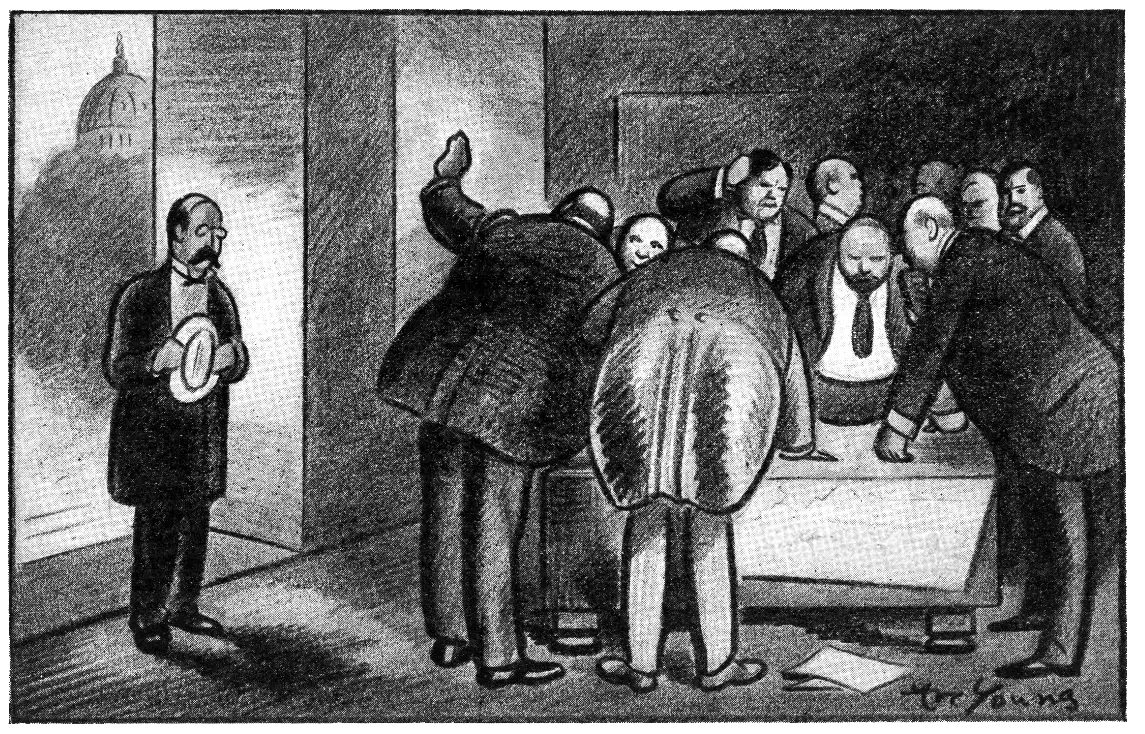
Arthur Young, The Masses, August 1917

Arthur Young, The Masses, August 1917
In our last issue, Piper French took aim at a statute that, she warned, was ballooning out of control. Debuted in the ’70s to curtail the Mafia, RICO (Racketeer Influenced and Corrupt Organizations Act) enabled prosecutors to go after Mob bosses for crimes carried out by their underlings. Decades later, it’s now being deployed against targets as disparate as rappers and schoolteachers, on alarmingly shaky grounds.
Since we published that piece, RICO has been used in Georgia — as French predicted — against both Donald Trump and the members of the Stop Cop City movement, which opposes the construction of a militarized police training facility on forest land. Liberals fond of comparing the Trump administration to a Mafia organization might find poetic justice in the mob statute’s weaponization against Trump, but RICO’s increasingly broad application should give us pause.
RICO allows the state to paint a picture of organized conspiracy whether or not one exists, compounding individual charges and lassoing in actors who have not necessarily done anything illegal themselves. The word “conspiracy” appears 236 times in the Cop City indictment; publishing a blog post calling for a “Week of Action,” for instance, was deemed “an overt act in furtherance of the conspiracy.”
During the Trump years, it became commonplace to say that we were living in a time of conspiracy theories — in our new “post-truth” age, a pizza restaurant was the center of a child sex trafficking ring, a kompromat pee tape was imminently forthcoming, and accusations of “fake news” flew across the aisle. If the far right was piecing together cryptic messages from Q, liberals transformed into forensic investigators, reading White House interns’ hand gestures and ICE agents’ tattoos as evidence of a vast, coordinated scheme. QAnon adherents are now members of Congress, anti-vaxxers continue to cast the “plandemic” as a ruse designed to implement authoritarian control, and D.A.s are reading nefarious intent into “anarchist terms” like “solidarity,” “mutual aid,” and “collective,” per the Cop City indictment. Meanwhile, the phrase “conspiracy theory” is thrown around as a way of halting dissent against accepted opinion: the contention that Covid arose from an accidental leak in an American-funded lab in Wuhan, initially tarred as a fringe absurdity, seems to grow more credible by the day.
It’s easy to blame crises like Trump’s election, or the pandemic, on malicious and controlled efforts — much harder to reckon with the reality that often no one, malicious or otherwise, is in control. Sometimes the culprit is short-sighted policy, or bureaucratic incompetence, or the organized corruption that’s announced openly on the debate stage or the nightly news. In our eleventh issue, we’re furthering a few theories of our own, taking a closer look at villainous machinations carried out in plain sight.
For our interview, we spoke with Argentine political theorist and feminist activist Verónica Gago about progressive movements on a continent still recovering from the regimes of U.S.-installed dictators. In our Dispatches, we asked scholars, lawyers, and organizers how the left should answer the Federalist Society, whose forty-year campaign has culminated in a right-wing Supreme Court coup.
Gaby Del Valle examines collusion between xenophobia and environmentalism, and Alexander Wells conjures up the noir image of “secret codes and bugged phones and leather jackets and smoke-filled rooms” to scrutinize the role of the “dissident” in our current culture wars. Hannah Gold reads Mary Gaitskill’s Substack for clues about the author’s renewed popularity, and Sophie Lewis shows us how The Little Mermaid’s subversive politics have been washed away. Reviewing J.M. Coetzee’s latest novel, Ella Fox-Martens discusses his discomfort with the hegemony of English.
In our fiction section, Eliza Barry Callahan’s “Moments of Elevation,” an excerpt from her forthcoming novel The Hearing Test, picks up where the Havana Syndrome theory left off, with a case of sudden deafness. Steven Duong’s “Dorchester” depicts a young poet reckoning with an explosive family secret. “Greenness,” by Xavier Blackwell-Lipkind, constructs hidden meanings from random patterns, and K Patrick serves up a ghost story, “Davy.” In our poetry section, George Abraham adds us to the “watchlist,” and Harmony Holiday describes “the paranoia of the double.” Prince Bush takes us to outer space; Emma Winsor Wood takes us to the aquarium.
Even our Mentions are in on the plot — we reviewed, among other things, the hotel at the center of a congressional ethics complaint. And don’t worry, we won’t prosecute our critics: we’re introducing a new print-only Letters to the Editors section, in which we’ll make space for gripes, quibbles, and all manner of responses.
We hope you enjoy what our own little organization has been working on, behind closed doors.